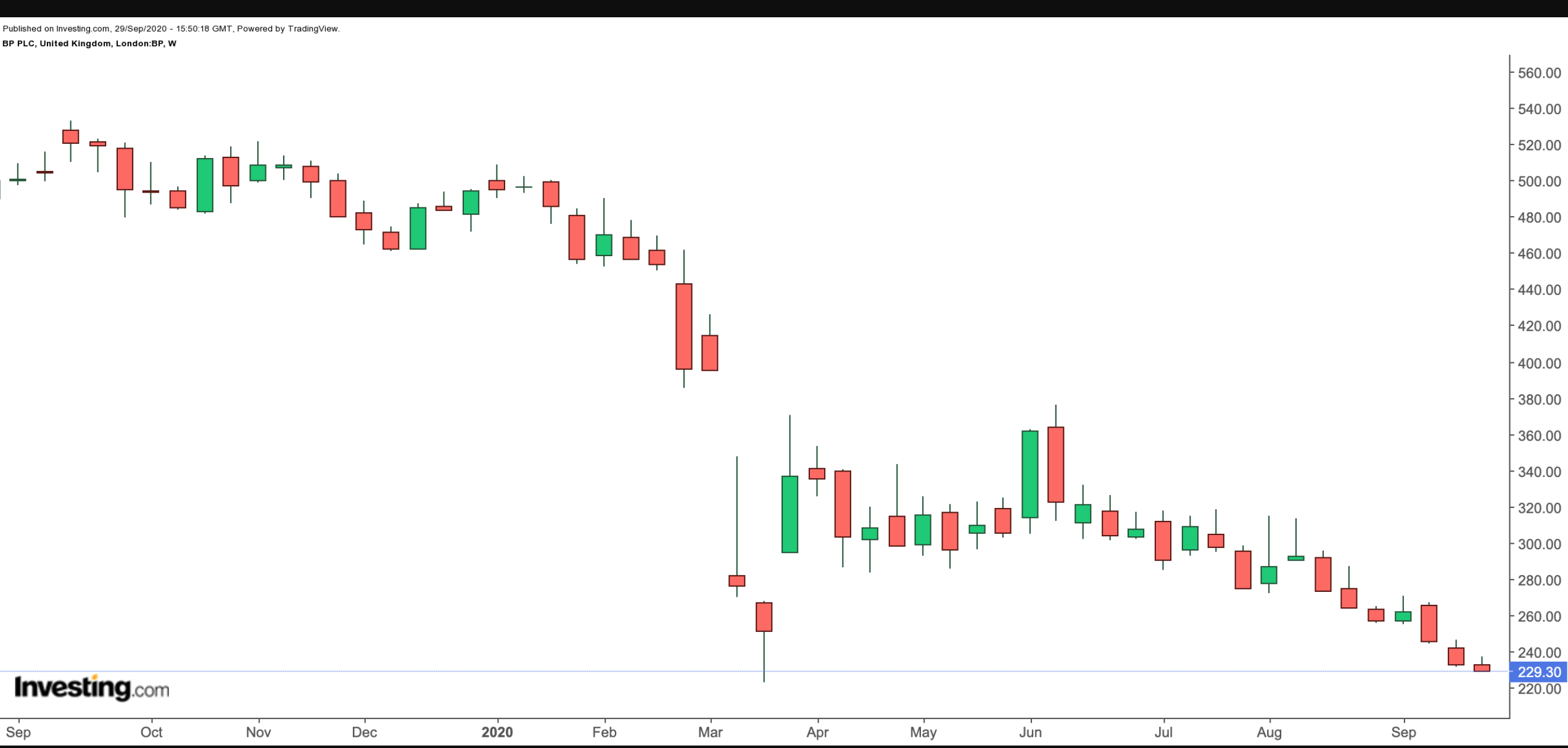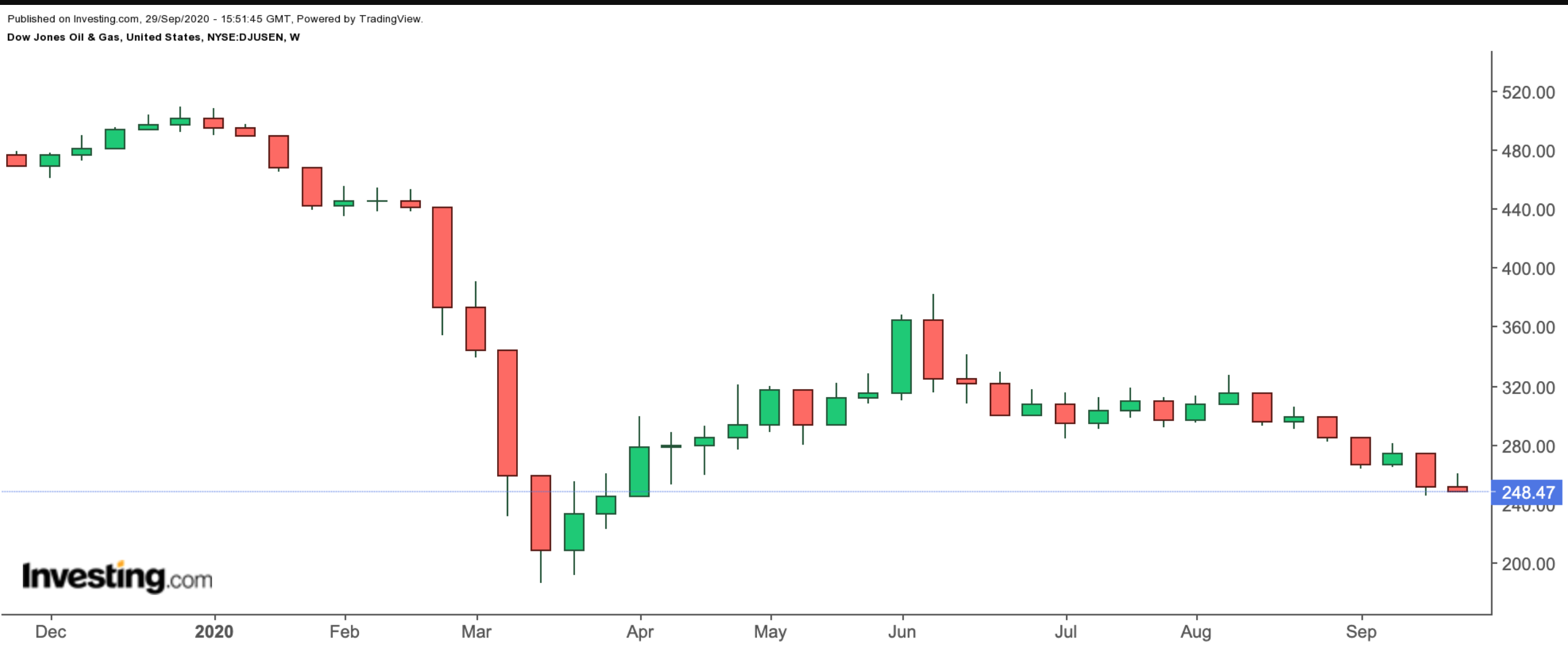The year 2020 has not been kind to the oil industry. Brent crude, the international benchmark, started the year around $60. By late April, it was below $20. When various lockdowns eased in early summer, oil prices gained pace and reached a six-month high. A run-up toward the $50 level looked likely.
Yet, September has brought back question marks about the industry's future for the rest of the year as well as price weakness. Although Brent is still over $40, many analysts concur that a decline toward $35 cannot be ruled out.
According to the Organization of the Petroleum Exporting Countries (OPEC), in September:
"The global economic growth forecast is revised down to -4.1% for 2020 from -4.0% in the previous month, amid a further slowing momentum in especially emerging and developing economies... In 2020, the global oil demand contraction is revised down further by 0.4 (million barrels per day)."
Earlier, we have looked at how investors could use exchange-traded funds (ETFs) to participate in moves in oil prices. Today, we extend the discussion to UK-based oil major BP (LON:BP), (NYSE:BP).
At the start of the year, both BP and Royal Dutch Shell (LON:RDSa), (NYSE:RDSa) had the largest market capitalization on the FTSE 100, the UK's leading stock index. But their fall from grace has been fast and furious. Shares of each company now trade at less than half their former market caps. On Sept. 29, BP stock closed at 229.30p ($17.67 for U.S.-based shares).

Similarly, the Dow Jones Oil & Gas index is down about 46%. U.S.-based oil majors Chevron (NYSE:CVX) and Exxon Mobil (NYSE:XOM) are also down 41% and 51%, respectively.

On a side note, biopharma giants and COVID-19 vaccine-forerunners AstraZeneca PLC (LON:AZN), (NYSE:AZN) and GlaxoSmithKline (LON:GSK), (NYSE:GSK) currently hold the leadership position on the FTSE 100.
Let's take a look at BP to see whether a contrarian bet could be appropriate.
Dismal Quarterly Results
The short-term fortunes of BP shareholders have always been closely linked to the price of oil. Higher oil prices help increase revenues, cash flows and profits. In early August, London, U.K.-based BP reported poor Q2 results, which showed a loss of $16.8 billion, compared with a profit of $1.8 billion in Q2 2019.
The company also cut its dividend in half. Although the reduction was expected, it still dampened investor sentiment. In 2010, BP had axed dividends to pay for the oil spill disaster at the time. Then, to the delight of long-term shareholders, it became a consistent dividend payer, regularly having increased payouts. With the recent dividend cut, management admitted to uncertainty regarding future profits.
In recent quarters, the company has been diversifying the portfolio and increasing its alternative energy products, including renewable fuels and power. Yet, BP is still known as an oil “super-major.”
However, CEO Bernard Looney has made clear that he is at the helm to make it a more integrated energy company. During the decade, management plans to cut the company's oil and gas output by 40%. Instead, the group will put more resources into electricity generation and clean energy.
Earlier in September, BP released its "Energy Outlook 2020." One of the key messages was:
"The structure of energy demand is likely to change over time: declining role of fossil fuels, offset by an increasing share of renewable energy and a growing role for electricity. These changes underpin core beliefs about how the structure of energy demand may change."
Put another way, BP believes now is the time to look at alternative energy sources. Renewable energy players are likely to be rewarded handsomely.
Bottom Line
We'd argue that many investors have a love-hate relationship with energy, particularly oil companies. As the final quarter of the year begins, the oil industry is once again facing rising supplies and lower demand. In the case of a slow economic recovery worldwide, oil prices may once again go toward the $30-level or even below. Then, BP shares could suffer further.
So far in 2020, BP has fallen more than 50%. Its forward P/E and P/S ratios stand at 21.65 and 0.27. Short-term, we'd not yet be buyers of the shares, while another 5%-7% decline is still on the cards. Those market participants who are not currently BP shareholders may consider waiting on the sidelines in the coming weeks. They may also want to analyze the next quarterly results while management charts a new course of action.
We would not advocate bottom picking. However, in the long run, we see value in holding an oil company and consider buying the dips in price. Numbers from the industry or BP's quarterly metrics may not look pretty. Yet, the company's history goes back to 1909. Thus, it is likely to weather the current storm like many others that have passed in the last century.
